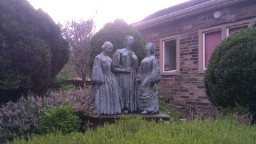
Statue of the three Brontë Sisters in the private garden of the Brontë Parsonage Museum.
“What matters it, that, all around,
Danger and guilt and darkness lie,
If but within our bosom’s bound,
We hold a bright, untroubled sky…?”
(‘To Imagination’)
For those familiar with Emily Brontë’s turbulent masterpiece Wuthering Heights, the powerful hope expressed in these lines is fresh and unexpected. The fierce delivery, however, retains Brontë’s distinctive character, ever defiant in the face of “danger and guilt and darkness.” The full poem is included in Penguin’s recent ‘Little Black Classics’ selection of her poetry, a slim volume that is well worth its eighty pence price tag. Not only are the poems absorbing and evocative, the very fact of their publication invites interesting considerations of all three sisters’ wider accomplishments, beyond the attention that is traditionally lavished on Wuthering Heights and Jane Eyre.
Jane Eyre’s exploration of identity and its confident proto-feminist themes remain relevant and thought-provoking, whilst Wuthering Heights’ unique love story continues to spark debate. Like many fans of the Brontës, these novels were my first encounter with the worlds of these exceptional siblings, and I continue to adore and appreciate them. Yet an unfortunate side effect of their popularity is that many of the sisters’ other creations find themselves hidden in the shadows. The Brontës have a surprisingly sprawling output and Penguin’s decision to publish Emily’s poetry is fantastic; it displays a growing appreciation for the minor works, enjoyable and highly rewarding works of literature that are equally deserving of love and attention from Brontë enthusiasts.
Yet it was not just Emily who was a keen poet as well as an accomplished novelist. Charlotte and Anne also wrote poetry prolifically and these works shed a renewed light on their novels, as well as being beautiful and moving in their own right. All three sisters deal with a variety of themes but also display a compellingly intimate spectrum of emotion. Charlotte’s poem on the death of Anne is a raw expression of grief that not only illuminates the close sibling relationships, but also forms a real parallel to the intensity of Jane’s relationship with Helen Burns in Jane Eyre. Similarly, Anne’s own poetry deals with the concept of injustice, something which she brought to fruition in her longer prose works. Gondal, the fantasy world created by Anne and Emily in their youth, is the setting for much of her poetry; it is a world of dungeons and mountains, a world where characters strive for liberty and make impassioned declarations of love to children who are caught amongst adult politics. As a feat of the imagination, it is almost impossibly vivid.
It is interesting that this inventive setting is mostly found in Anne’s poetry, despite the fact that her prose tends to be rooted in reality a little more than that of her sisters. This is not to say, however, that Agnes Grey and The Tenant of Wildfell Hall are lacking in power and creativity. Though Anne’s novels are fairly well known, her writing tends to be overlooked in favour of the works of her sisters. This is a great shame because in Agnes Grey we find another protagonist in the vein of Jane Eyre, a young governess striving for independence in spite of her poverty. Through her eyes, we experience not only a romance but a meditation on the nature of love, as well as a sharp exploration of social divides in the nineteenth century. Furthermore, this unflinching interest in contemporary issues lead to her second novel, The Tenant of Wildfell Hall, being condemned upon its initial publication as “coarse”, “brutal” and unsuitable for ladies. Its protagonist is a woman trapped in an abusive marriage with an alcoholic, and her growing fears for herself and her son are treated with intense emotional realism. Gripping and uncomfortable, this novel was highly progressive, and remains absorbing as well as significant to the modern reader. It should not be overlooked.
Jane Eyre and Wuthering Heights will always remain popular, not only with me but with the countless other readers who continue to be spellbound by Heathcliff and Cathy’s destructive relationship. Jane’s famous declaration, “Reader, I married him”, will always resonate with that simple happiness that so many come to desire for Charlotte’s most celebrated protagonist. Yet what is wonderful is that the world of the Brontë sisters need not be limited by the conclusions of these novels. I cannot recommend the rich and varied canon of their minor works enough for those who wish to gain a greater appreciation of this unique and talented trio of siblings.
